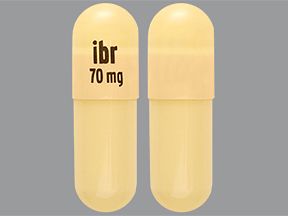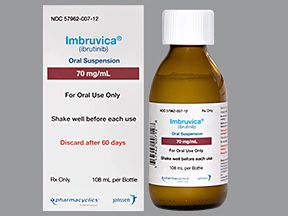Imbruvica (ibrutinib) is a brand-name prescription medication. The Food and Drug Administration (FDA) has approved it to treat the following conditions in adults:
- certain types of leukemia and lymphoma such as:
- chronic (long-term) graft versus host disease
Imbruvica comes as an oral tablet and an oral capsule. It belongs to a class of medications known as kinase inhibitors.
Imbruvica is available only as a brand-name medication. There is currently no generic form of the drug.
For information about Imbruvica dosing for CLL and more, keep reading. You can also learn about the drug’s strengths and how to take the medication. For a comprehensive look at Imbruvica, see this article.
* For this condition, Imbruvica received
Dosage summary
Below is a summary of the forms, strengths, and typical dosages of Imbruvica. Your doctor will determine the dosage that’s best for you.
| Imbruvica forms | Strengths | Typical dosages |
| oral tablet | • 140 milligrams (mg) • 280 mg • 420 mg • 560 mg | • 420 mg once per day • 560 mg once per day |
| oral capsule | • 70 mg • 140 mg | • 420 mg once per day • 560 mg once per day |
This article describes typical dosages for Imbruvica provided by the drug’s manufacturer. When taking Imbruvica, always follow the dosage prescribed by your doctor.
Below is information about Imbruvica’s recommended dosages for its approved uses.
Imbruvica forms
Imbruvica comes in two oral forms: a tablet and a capsule.
Imbruvica strengths
Imbruvica tablets come in four strengths:
- 140 milligrams (mg)
- 280 mg
- 420 mg
- 560 mg
Imbruvica capsules come in two strengths:
- 70 mg
- 140 mg
Typical dosages
Typically, your doctor will start you on a low dosage. Then they’ll adjust it over time to reach the amount that’s right for you. Your doctor will ultimately prescribe the smallest dosage that provides the desired effect.
The following chart shows dosing schedules that are commonly taken or recommended. However, be sure to take the dosage your doctor prescribes for you. Your doctor will determine the best dosage to fit your needs.
| Condition | Imbruvica dosage |
| chronic lymphocytic leukemia* | 420 mg once per day |
| small lymphocytic lymphoma* | 420 mg once per day |
| marginal zone lymphoma | 560 mg once per day |
| mantle cell lymphoma | 560 mg once per day |
| Waldenström’s macroglobulonemia (WM)† | 420 mg once per day |
| chronic graft versus host disease | 420 mg once per day |
* For this condition, Imbruvica may be given by itself or with the drugs rituximab (Rituxan) or obinutuzumab (Gazyva). It can also be given with bendamustine (Bendeka, Treanda) and rituximab.
† For WM, Imbruvica may be given by itself or with the drug rituximab.
Long-term treatment
Imbruvica is meant to be taken as a long-term treatment. If you and your doctor determine that Imbruvica is safe and effective for you, you’ll likely take it long term.
The Imbruvica dosage your doctor prescribes will depend on several factors. These include:
- the type and severity of the condition you’re taking Imbruvica to treat
- the form of Imbruvica you take
- your age
- other medical conditions you may have
Dosage adjustments
If you have decreased liver function, your doctor may adjust your Imbruvica dosage. If you have kidney problems, you may wonder about renal (kidney) dosing for Imbruvica. The dosage of Imbruvica doesn’t change if you have kidney problems.
You should always take the dosage your doctor prescribes. For questions about changes in your dosage, talk with your doctor.
Dose reduction
If you get certain side effects after taking Imbruvica, your doctor may lower your dosage. If your condition worsens or you develop side effects that you cannot tolerate, your doctor may have you stop taking Imbruvica.
Some of these side effects include:
- anemia (low red blood cell count)
- thrombocytopenia (low platelet count)
- neutropenia (low white blood cell count)
- infection, such as pneumonia
- atrial fibrillation (a problem with the heart’s rhythm)
- tumor lysis syndrome (with this condition, cancer cells die quickly, and your body is unable to get rid of them fast enough)
- other types of cancer
- severe allergic reaction
- severe unexplained bleeding
For more information about these side effects and their symptoms, see this article or talk with your doctor. Be sure only to take the dosage that your doctor prescribes you.
If you miss a dose of Imbruvica, take it as soon as possible on the same day as the missed dose. You should continue with your usual dosage schedule the next day. Do not double up on doses of Imbruvica to make up for the missed dose.
To help make sure that you don’t miss a dose, try using a medication reminder. This can include setting an alarm or using a timer. You could also download a reminder app on your phone.
You’ll take Imbruvica at the same time each day with a glass of water. You should swallow the tablets or capsules whole. Do not open, break, crush or chew them.
If you have trouble swallowing Imbruvica tablets or capsules, see this article or talk with your doctor.
Accessible drug labels and containersIf you’re having trouble reading your prescription label, talk with your doctor or pharmacist. Some pharmacies offer labels with large print, Braille, or a code you scan with a smartphone to convert text to speech. If your local pharmacy doesn’t have these options, your doctor or pharmacist might be able to recommend a pharmacy that does.
If you’re having trouble opening medication bottles, ask your pharmacist about putting Imbruvica in an easy-open container. They also may recommend tools that can make it easier to open bottles.
If you take more Imbruvica than your doctor prescribes, you may develop serious side effects. (For more information, see this article). It’s important that you don’t take more Imbruvica than your doctor advises.
Symptoms of an overdose
Taking too much Imbruvica could increase your risk of side effects. (To learn about the side effects of Imbruvica, see this article.)
If you take more than the recommended amount of Imbruvica
Call your doctor right away if you believe you’ve taken too much Imbruvica. Another option is to call the American Association of Poison Control Centers at 800-222-1222 or use its online tool. If you have severe symptoms, immediately call 911 or your local emergency number, or go to the nearest emergency room.
The dosages in this article are typical dosages provided by the drug manufacturer. If your doctor recommends Imbruvica for you, they will prescribe the dosage that’s right for you. Always follow the dosage that your doctor prescribes for you.
As with any drug, never change your dosage of Imbruvica without your doctor’s recommendation. If you have questions about the dosage of Imbruvica that’s right for you, talk with your doctor.
Besides learning about dosage, you may want other information about Imbruvica. These additional articles might be helpful to you:
- More about Imbruvica. For information about other aspects of Imbruvica, refer to this article.
- Side effects. To learn about the side effects of Imbruvica, see this article. You can also look at the Imbruvica prescribing information.
- Drug comparison. To find out how Imbruvica compares with Venclexta, read this article.
- Details about your condition. For more information about cancer, see our cancer hub, as well as our list of cancer and oncology articles. For details about graft-versus-host disease, see this list of transplant articles.
Disclaimer: Medical News Today has made every effort to make certain that all information is factually correct, comprehensive, and up to date. However, this article should not be used as a substitute for the knowledge and expertise of a licensed healthcare professional. You should always consult your doctor or another healthcare professional before taking any medication. The drug information contained herein is subject to change and is not intended to cover all possible uses, directions, precautions, warnings, drug interactions, allergic reactions, or adverse effects. The absence of warnings or other information for a given drug does not indicate that the drug or drug combination is safe, effective, or appropriate for all patients or all specific uses.


